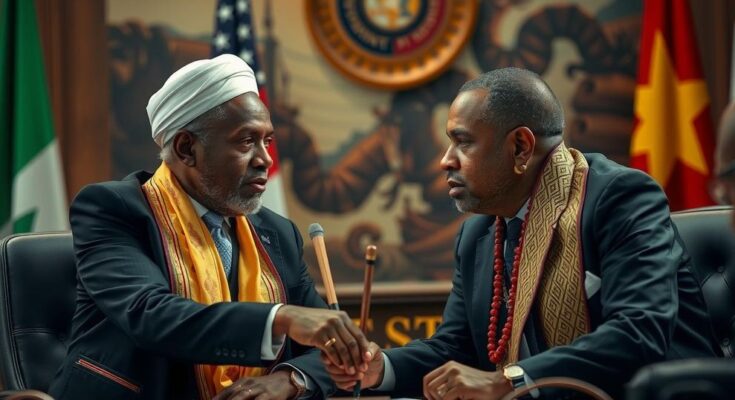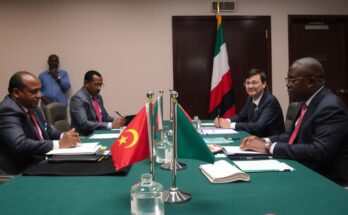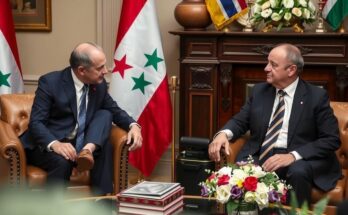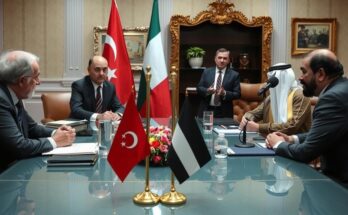El Burhan visited South Sudan to address crucial issues amid rising military tensions, notably regarding oil pipeline transport and regional governance. This marks his third official visit since the conflict’s escalation, reflecting concerns over economic losses and a lack of effective leadership in Sudan.
Lieutenant General Abdel Fattah El Burhan, the President of Sudan’s Sovereignty Council and Commander-in-Chief of the Sudanese Armed Forces (SAF), recently made an unannounced visit to Juba, the capital of South Sudan. This marks his third official trip to the nation since the resurgence of hostilities between the SAF and the Rapid Support Forces (RSF) began in mid-April of the previous year. During his visit, El Burhan was warmly welcomed at Juba International Airport by South Sudan’s President Salva Kiir Mayardit and members of the Sudanese diplomatic mission in Juba.
Accompanying El Burhan were notable officials including the Minister of Energy and Oil, Mohyieddin Naeem; the Undersecretary of Foreign Affairs, Ambassador Hussein El Amin; and the Director-General of the General Intelligence Service, Lieutenant General Ahmed Mufaddal. Their discussions centered on four critical issues impacting the bilateral relations between Sudan and South Sudan, highlighted by rising military tensions along their shared border, particularly in the regions of Babnis, Joda, and El Jabalein.
The ongoing military confrontations include areas such as the contested oil-rich region of Heglig, which remains under Sudanese administration despite being claimed by South Sudan as well. Another significant topic was the pipeline transporting South Sudanese crude oil to Bashayer Port, which has been inoperative since February due to technical issues, leading both nations to suffer considerable economic losses.
South Sudan, heavily reliant on oil revenues, faces monthly losses reportedly upwards of $100 million, while Sudan has lost substantial transit fees as a result of the operational halt.
El Burhan’s visit additionally coincided with remarks from Taban Deng Gai, one of South Sudan’s vice presidents, criticizing the absence of governance in Sudan. His commentary follows escalating conflict and humanitarian crises in contested areas such as Abyei. The South Sudanese government clarified that Deng Gai’s statements do not reflect their official position. Observers speculate that El Burhan may formally address these remarks.
Historically, El Burhan came to power following a military coup against a civilian-led transitional government in October 2021. As the de facto guarantor of the 2018 revitalized South Sudan Peace Agreement, which led to the current transitional government in Juba, his presence is seen as crucial amidst recent disagreements within the signed factions, notably the South Sudan Opposition Alliance. Such disagreements necessitate consultation with Sudan per the stipulations of the peace framework.
Lieutenant General Abdel Fattah El Burhan’s recent visit to South Sudan underscores the complexities of Sudan-South Sudan relations, particularly in the context of ongoing military conflicts and economic challenges. Since South Sudan’s secession from Sudan in 2011, oil transportation via Sudanese pipelines has been vital for South Sudan’s economy. However, interruptions in this service have led to significant fiscal losses. El Burhan’s trip also sheds light on broader political tensions within South Sudan, especially amidst critical feedback about governance in Sudan.
In summary, Lieutenant General Abdel Fattah El Burhan’s visit to South Sudan serves as a pivotal moment in addressing urgent issues concerning bilateral relations amid rising military tensions and economic hardships. The discussions surrounding oil exports, governance criticisms, and adherence to the South Sudan Peace Agreement highlight the intricate dynamics at play. As both nations navigate these challenges, El Burhan’s role could be instrumental in fostering peace and collaboration between Sudan and South Sudan.
Original Source: www.dabangasudan.org




